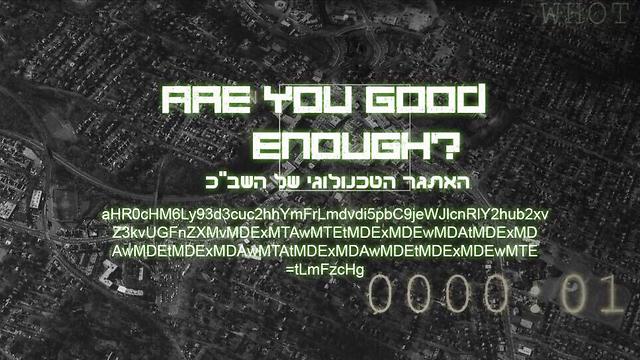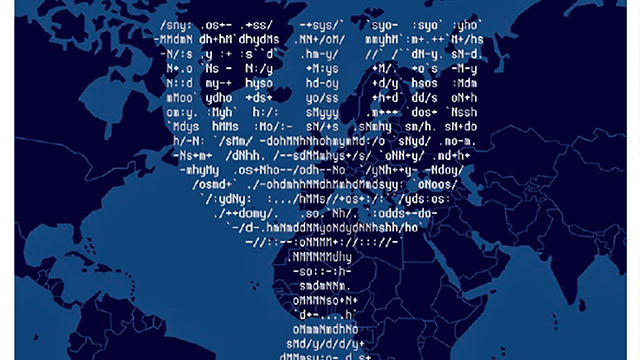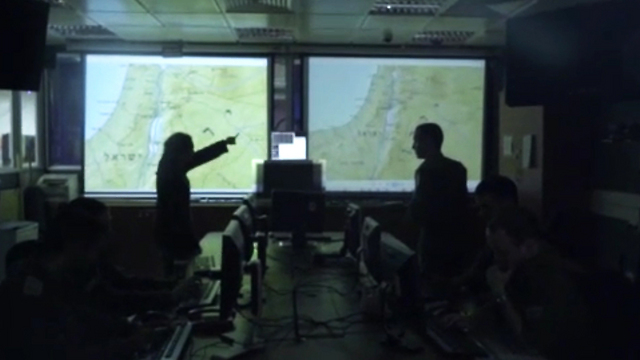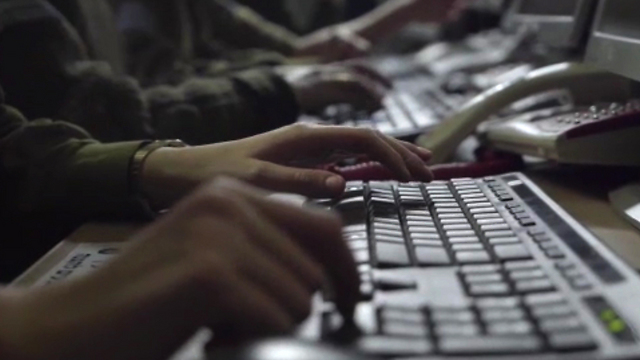These thousands of positions need to be filled, and over the past few years the Israeli intelligence community has been dedicated to this mission, which is becoming harder and harder to do.
Last Thursday, April 27, the Shin Bet (Israeli Security Agency, in charge of domestic counter-terrorism and counter espionage) came out with a new recruitment campaign in which, in addition to launching a new website with high quality graphics and attractive visuals, were also three unusual items that until recently were considered a blatant breach of the rules of secrecy: interviews with operatives, intelligence and technology personnel filmed in shadow; an elaborate promotional film, intended to show all the different divisions of the Shin Bet, and their complex and interesting work; and a cyber riddle comprised of several stages.
On Monday, the Mossad, which is in charge of Israeli intelligence operations abroad, came out with its own cyber riddle, in an effort to recruit new members to its cyber units.
Experts from both agencies are currently at a heated argument over which riddle is the hardest.
More than 100,000 people have tried to solve the Shin Bet's riddle (it is not known how many attempted to solve the Mossad's). 130 managed to solve the riddle's easier stages, while only 50 solved it in its entirety. It took the first people who solved it at least 48 hours. The film that depicts the thwarting of a suicide terrorist attack has more than 300,000 views and thousands of Facebook shares.
Ever since the Shin Bet's campaign was launched, roughly a thousand résumés have been submitted for the various positions the agency has to offer. Most of them, fortunately, were for positions in the field of technology.
The Shin Bet and the Mossad accept an extremely low number of applicants, who have to pass professional tests in their respective fields, a security screening and a psychological assessment. In the field of technology, however, two more factors make it difficult to locate and recruit the suitable individuals.
The first factor is the Shin Bet's concern that a large percentage of those who attempted to solve its riddle, and perhaps even a larger percentage of those who succeeded in solving it, were not really interested in the reward that comes with it—a good chance to be accepted to the Shin Bet—and merely did it since it seemed like something that many hackers and young cyber experts tend to enjoy. To negate this, the Shin Bet will attempt to contact those who solved the riddle but did not submit their résumés and try to convince them to do so.
The second factor, which is far more substantial, is the temptations that the Israeli hi-tech industry can offer. To put it differently, why would a talented young person who can make millions in the Israeli hi-tech industry prefer sleepless nights and a government paycheck as a member of the intelligence community?
Ever since the mid-90s, most of the Shin Bet's work has been based on technology. A quarter of its personnel deals with technology—an unprecedented number compared to most other intelligence agencies around the world. The Mossad went through this revolution during the last decade and, in fact, large sections of the Israeli hi-tech industry are built with the knowledge and experience gained in the intelligence world by people who started out in the Mossad, the Shin Bet or the Military Intelligence Directorate. Nevertheless, this industry offers temptations that the government sector finds hard to compete.
In the past, the sense of patriotism, adventure and impeccable prestige were tempting enough. Anonymous ads placed in the paper (that everyone knew had been placed by the intelligence community), in addition to personal referrals, filled the ranks of the intelligence community. These days, however, the Mossad and Shin Bet are finding it hard to fill the hundreds technological positions. Indeed, recently, the Shin Bet managed to convince the Finance Ministry to pay relatively large amounts to cyber geniuses who were willing to come work for the agency, but these sums are still a far cry from the millions that many young Israelis in the hi-tech sector dream of making in an "exit."
Until the late 60s, as per David Ben-Gurion's specific instructions, it was forbidden to even mention the names of the Mossad and the Shin Bet. Nowadays, Israel's intelligence agencies have no choice but to do what a decade ago was considered unthinkable: a highly-publicized recruitment campaign in their name—full of color, voices, and gimmicks—in an effort to emphasize the advantages only the Shin Bet and Mossad can offer—a sense of purpose, membership to a small and intimate circle of secret keepers, and plenty of action.
The Shin Bet and the Mossad's new recruitment approach makes for a fascinating story, but it also reflects the Israeli society in which these agencies operate, our society, which over the years has become much more individualistic and materialistic.






















